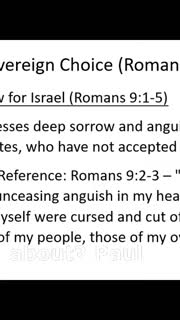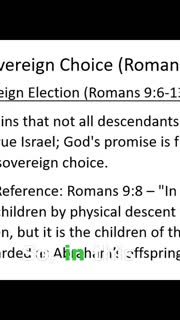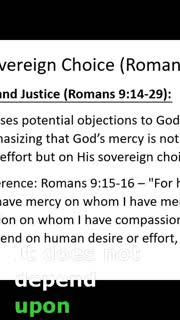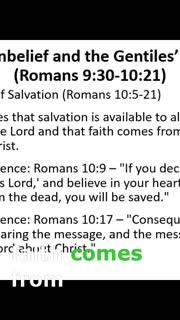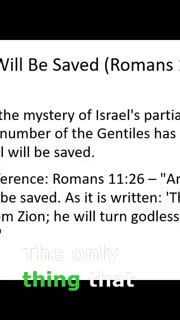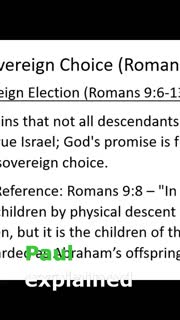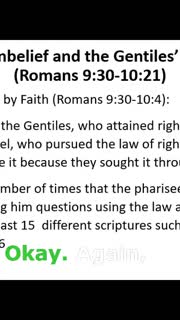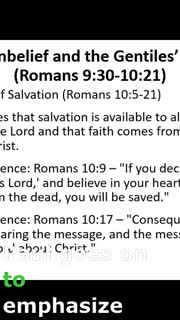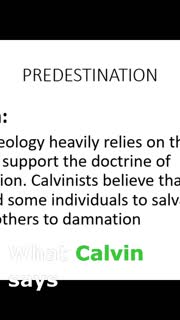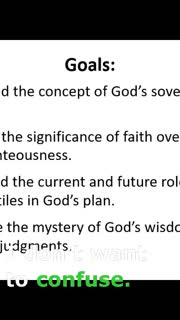God's Sovereign Plan: Salvation for All Humanity
Devotional
Sermon Summary
Bible Study Guide
Sermon Clips
### Quotes for Outreach
1. "Paul is concerned because Paul is a Jew, right? He's a Hellenistic Jew, but he's a Jew. And they had, the majority of them had refused to accept Christ. And so he was preaching to Gentiles primarily, but he's also preaching to Jews, both. Okay. And he said that he's sorrowful because they had not accepted Christ. And he was so sorrowful that he was willing to give his life for their life. Make sure you understand that. That's what he said. He says that if he could separate himself from Christ everyone else could be a part of Christ, he would accept that because of the love he had for his fellow man. That's a sacrifice in himself for others." (67 seconds)
2. "So, in this case, God is making the decision. So, just because someone is a biological offspring of Abraham does not automatically mean that they're going to read the promises that God provides. Okay? And a lot of Jews still believe that. Okay? Even to today." (20 seconds)
3. "It does not depend upon human desire or effort, but on God's mercy. So what does that mean? That we can't work hard enough and good enough to say to God that I deserve to be saved. Because it's not. It's based upon what we do, it's based upon our faith, and based upon what God chooses to do." (28 seconds)
4. "Faith comes from hearing the message and the message heard through the word. Okay. About Christ. You cannot have a faith in Christ if you haven't heard the word. So you have to, it's our responsibility is to share the word. That's our responsibility. No one can have faith in something they don't know anything about." (25 seconds)
5. "The only thing that matters is we are adopted into the family. God. Nothing else matters. Okay. So, okay. And so, and you find that in the new Testament. Israel does not. It's not always seen as the Jewish is seen as a name for the church. Okay. In this case, he would turn God and this away from Jacob. Jacob name was what was Jacob's name, Israel. That's right. Okay. So again, when we think, when we look at this and reading this, we need to make sure we understand what is being said." (44 seconds)
### Quotes for Members
1. "Paul explained that not all descendants of Israel are part of two Israel. This is where it's going to get kind of complicated a little bit. Okay? Because what did God promise Abraham? What did God promise? What was the covenant with Abraham? The covenant with Abraham was that the children of his children would be as many as the sands. And that they were going to be saved. Okay? That was part of the covenant. That was the relationship we had. Okay? And so here, but then Paul says what? He says, but everybody's not going to be saved. Everyone's not going to be saved. See, at that time, what happened, and even now today, there's some Jews who believe that just because they're Jewish, just because they are from Abraham's seed, that they are going to be saved. For no other reason. Other than that. And he's trying to say, no, that's not the way it works." (82 seconds)
2. "Again, Paul is talking about righteousness by faith, not by words, but by faith. Okay. And then he contrasts a Gentile who attained righteousness. It's by faith with Israel who pursued the law of righteousness. Okay. And when I was reading that and thinking about that, I thought about the number of times that Christ was, was, was tried by the Pharisees. Every time that they tried to, to, uh, trick him, what did they do? They talked about the law. They said, the law said something, something, something. Okay. And then they would always bring that up. And then Christ would have to respond. Okay. Because they were still living, supposedly, theoretically, supposedly under the law. Christ said he fulfilled the law. He didn't come to break the law. Okay. All right. So what we have here is that the Gentiles were not tied to the law like the Jewish population was. They were tied to faith. That's why they would receive righteousness. Whereas the Jews had to learn to get away from the law and not, not, I don't mean break it, but you mean not use it as a crutch and use faith." (97 seconds)
3. "Paul goes on to emphasize that salvation is available for all who call on the name of the Lord, Jews and Gentiles. Now, what's interesting about this is that the first part of this, even though Paul is preaching to the Gentiles for the most part, the first part of this is not to the Gentiles. It's really to the Jewish population. Because he's trying to explain to them why, what they thought was wrong. He has no reason to talk about that to Gentiles. The Gentiles have no clue. Okay. So when people say that Paul preached only to the Gentiles, that's not true. He preached to Jews and Gentiles. Okay. He included a quarter. So the first part is he talked to the Jews. Now he's saying, but now understand that this is for everybody. So now he's talking. He's not ignoring the Jewish, but he's now about the Gentiles. He said, what he said, if you declare with your mouth, Jesus, Lord, and believe in your heart that God raised up from the dead, you will be saved. So it's not the law is to believe. It's not the law is to believe in the faith." (93 seconds)
4. "What Calvin says is that if I could do something that would cause me to be saved. Okay. Then that means that I work for it. That was his argument. And since we can't work our way into heaven, then that means that God chooses who he wants in heaven. And therefore, I don't have any say so. I don't have any say so. Okay. It just happens. For whatever reason, he chooses me and not him. Or he chooses Clarence and not me. Nothing I could do changed that. Okay. Okay. That's what Calvin preached." (50 seconds)
5. "I don't want to confuse. Everyone. Okay. But you, you're going to be faced with these kinds of questions, either personally or someone's going to come to you and ask you these questions. They're going to ask you about predestination. You need to know where it comes from. It comes from Romans. Now, I can't, we can't study the book of Romans instead of just one verse, a few verses. We got to study, we study the whole book of Romans, right? Which means that there's something, there's a mystery. And that's just. wish I could explain all of it to you, but I can't. Okay. Uh, but the bottom line is that, uh, that anyone who says that this verse means that we're predestined, that we don't have to do anything. That's not what Paul said. Paul does not say, don't do anything. Doesn't say that. Okay. Paul does say, do something. That doesn't mean we're working for our salvation. Because. You know, that we can earn it, but it doesn't mean that if we don't do certain things, we automatically are going to be eliminated from the process." (72 seconds)
Ask a question about this sermon
1. "Paul is concerned because Paul is a Jew, right? He's a Hellenistic Jew, but he's a Jew. And they had, the majority of them had refused to accept Christ. And so he was preaching to Gentiles primarily, but he's also preaching to Jews, both. Okay. And he said that he's sorrowful because they had not accepted Christ. And he was so sorrowful that he was willing to give his life for their life. Make sure you understand that. That's what he said. He says that if he could separate himself from Christ everyone else could be a part of Christ, he would accept that because of the love he had for his fellow man. That's a sacrifice in himself for others." (67 seconds)
2. "So, in this case, God is making the decision. So, just because someone is a biological offspring of Abraham does not automatically mean that they're going to read the promises that God provides. Okay? And a lot of Jews still believe that. Okay? Even to today." (20 seconds)
3. "It does not depend upon human desire or effort, but on God's mercy. So what does that mean? That we can't work hard enough and good enough to say to God that I deserve to be saved. Because it's not. It's based upon what we do, it's based upon our faith, and based upon what God chooses to do." (28 seconds)
4. "Faith comes from hearing the message and the message heard through the word. Okay. About Christ. You cannot have a faith in Christ if you haven't heard the word. So you have to, it's our responsibility is to share the word. That's our responsibility. No one can have faith in something they don't know anything about." (25 seconds)
5. "The only thing that matters is we are adopted into the family. God. Nothing else matters. Okay. So, okay. And so, and you find that in the new Testament. Israel does not. It's not always seen as the Jewish is seen as a name for the church. Okay. In this case, he would turn God and this away from Jacob. Jacob name was what was Jacob's name, Israel. That's right. Okay. So again, when we think, when we look at this and reading this, we need to make sure we understand what is being said." (44 seconds)
### Quotes for Members
1. "Paul explained that not all descendants of Israel are part of two Israel. This is where it's going to get kind of complicated a little bit. Okay? Because what did God promise Abraham? What did God promise? What was the covenant with Abraham? The covenant with Abraham was that the children of his children would be as many as the sands. And that they were going to be saved. Okay? That was part of the covenant. That was the relationship we had. Okay? And so here, but then Paul says what? He says, but everybody's not going to be saved. Everyone's not going to be saved. See, at that time, what happened, and even now today, there's some Jews who believe that just because they're Jewish, just because they are from Abraham's seed, that they are going to be saved. For no other reason. Other than that. And he's trying to say, no, that's not the way it works." (82 seconds)
2. "Again, Paul is talking about righteousness by faith, not by words, but by faith. Okay. And then he contrasts a Gentile who attained righteousness. It's by faith with Israel who pursued the law of righteousness. Okay. And when I was reading that and thinking about that, I thought about the number of times that Christ was, was, was tried by the Pharisees. Every time that they tried to, to, uh, trick him, what did they do? They talked about the law. They said, the law said something, something, something. Okay. And then they would always bring that up. And then Christ would have to respond. Okay. Because they were still living, supposedly, theoretically, supposedly under the law. Christ said he fulfilled the law. He didn't come to break the law. Okay. All right. So what we have here is that the Gentiles were not tied to the law like the Jewish population was. They were tied to faith. That's why they would receive righteousness. Whereas the Jews had to learn to get away from the law and not, not, I don't mean break it, but you mean not use it as a crutch and use faith." (97 seconds)
3. "Paul goes on to emphasize that salvation is available for all who call on the name of the Lord, Jews and Gentiles. Now, what's interesting about this is that the first part of this, even though Paul is preaching to the Gentiles for the most part, the first part of this is not to the Gentiles. It's really to the Jewish population. Because he's trying to explain to them why, what they thought was wrong. He has no reason to talk about that to Gentiles. The Gentiles have no clue. Okay. So when people say that Paul preached only to the Gentiles, that's not true. He preached to Jews and Gentiles. Okay. He included a quarter. So the first part is he talked to the Jews. Now he's saying, but now understand that this is for everybody. So now he's talking. He's not ignoring the Jewish, but he's now about the Gentiles. He said, what he said, if you declare with your mouth, Jesus, Lord, and believe in your heart that God raised up from the dead, you will be saved. So it's not the law is to believe. It's not the law is to believe in the faith." (93 seconds)
4. "What Calvin says is that if I could do something that would cause me to be saved. Okay. Then that means that I work for it. That was his argument. And since we can't work our way into heaven, then that means that God chooses who he wants in heaven. And therefore, I don't have any say so. I don't have any say so. Okay. It just happens. For whatever reason, he chooses me and not him. Or he chooses Clarence and not me. Nothing I could do changed that. Okay. Okay. That's what Calvin preached." (50 seconds)
5. "I don't want to confuse. Everyone. Okay. But you, you're going to be faced with these kinds of questions, either personally or someone's going to come to you and ask you these questions. They're going to ask you about predestination. You need to know where it comes from. It comes from Romans. Now, I can't, we can't study the book of Romans instead of just one verse, a few verses. We got to study, we study the whole book of Romans, right? Which means that there's something, there's a mystery. And that's just. wish I could explain all of it to you, but I can't. Okay. Uh, but the bottom line is that, uh, that anyone who says that this verse means that we're predestined, that we don't have to do anything. That's not what Paul said. Paul does not say, don't do anything. Doesn't say that. Okay. Paul does say, do something. That doesn't mean we're working for our salvation. Because. You know, that we can earn it, but it doesn't mean that if we don't do certain things, we automatically are going to be eliminated from the process." (72 seconds)
